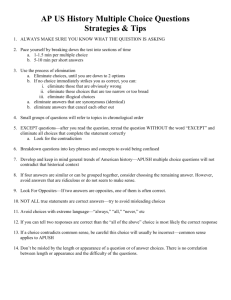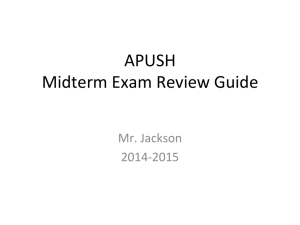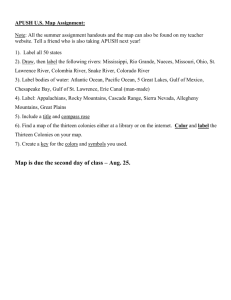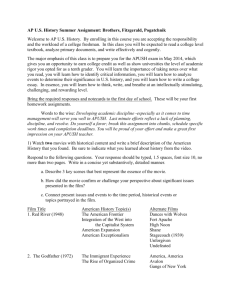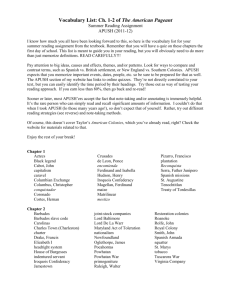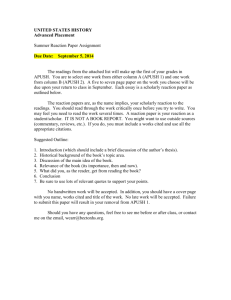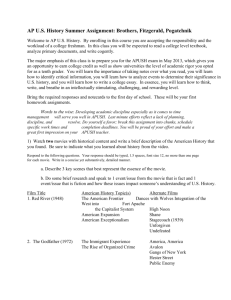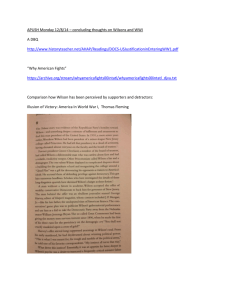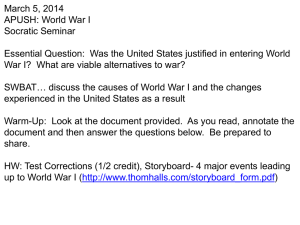apush exam review - AHS AP US HISTORY / FrontPage
advertisement
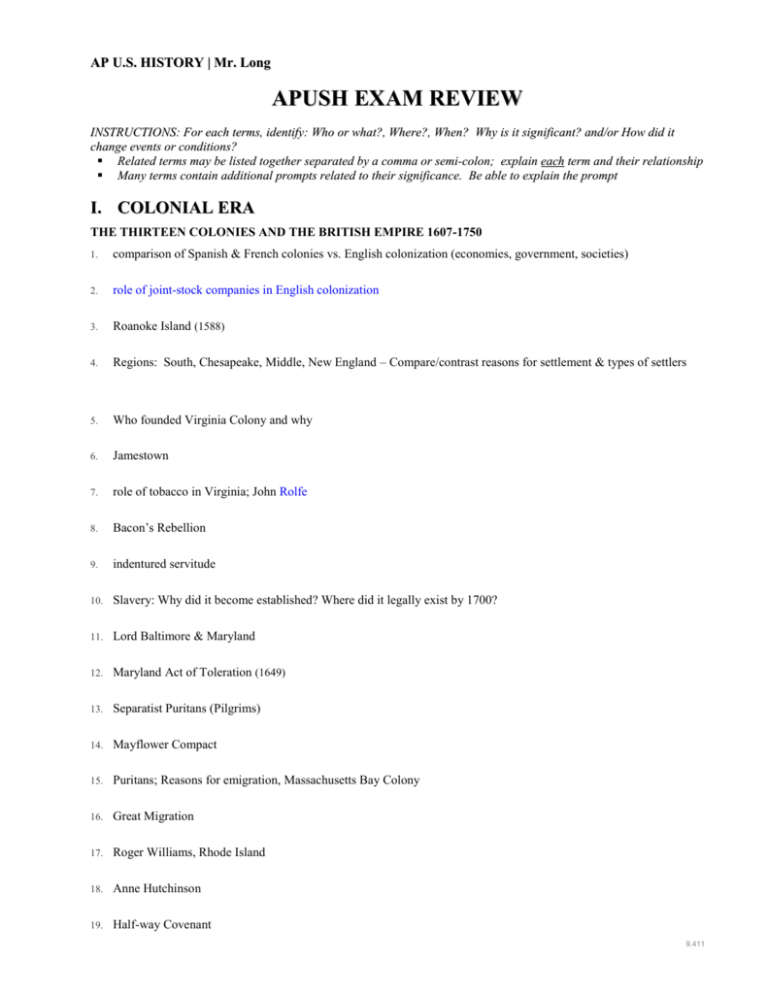
AP U.S. HISTORY | Mr. Long APUSH EXAM REVIEW INSTRUCTIONS: For each terms, identify: Who or what?, Where?, When? Why is it significant? and/or How did it change events or conditions? Related terms may be listed together separated by a comma or semi-colon; explain each term and their relationship Many terms contain additional prompts related to their significance. Be able to explain the prompt I. COLONIAL ERA THE THIRTEEN COLONIES AND THE BRITISH EMPIRE 1607-1750 1. comparison of Spanish & French colonies vs. English colonization (economies, government, societies) 2. role of joint-stock companies in English colonization 3. Roanoke Island (1588) 4. Regions: South, Chesapeake, Middle, New England – Compare/contrast reasons for settlement & types of settlers 5. Who founded Virginia Colony and why 6. Jamestown 7. role of tobacco in Virginia; John Rolfe 8. Bacon’s Rebellion 9. indentured servitude 10. Slavery: Why did it become established? Where did it legally exist by 1700? 11. Lord Baltimore & Maryland 12. Maryland Act of Toleration (1649) 13. Separatist Puritans (Pilgrims) 14. Mayflower Compact 15. Puritans; Reasons for emigration, Massachusetts Bay Colony 16. Great Migration 17. Roger Williams, Rhode Island 18. Anne Hutchinson 19. Half-way Covenant 9.411 APUSH EXAM REVIEW 2 20. Old Deluder (Satan) Act 21. Metacom; King Phillip’s War 22. Why the Dutch settled New Netherland; New York 23. Quakers (Society of Friends) 24. William Penn & Pennsylvania as a “holy experiment” 25. Rice and indigo 26. Georgia; James Oglethorpe 27. mercantilism 28. Navigation Acts 29. colonial response to the Dominion of New England – and reaction of Great Britain 30. “triangular trade” 31. middle passage 32. Salem Witchcraft Trials (1692) COLONIAL SOCIETY IN THE 18TH CENTURY 33. Immigrant groups: Why, when & where they settled (English, Germans, Scots-Irish, Africans) 34. extent of social mobility 35. colonial family life (compare New England vs. Chesapeake) 36. Colonial governments: corporate, royal, proprietary (explain each, which colonies?) 37. colonial economies: variations by region/topography (New England, middle, Chesapeake & South) 38. salutary neglect 39. main religions by region/colony 40. religious toleration: reasons for, extent 41. (First) Great Awakening 42. Jonathon Edwards & George Whitefield 9.411 APUSH EXAM REVIEW 43. New Lights vs. Old Lights 44. deism 45. Enlightenment thought – main ideas 46. Benjamin Franklin 47. education in the colonies (sectarian/non-sectarian) 48. John Peter Zenger 49. Colonial governors and legislatures (reasons for colonial autonomy) 50. town meetings 51. Stono Rebellion 3 II. REVOLUTIONARY ERA THE COMING OF THE AMERICAN REVOLUTION, 1754-1775 52. French and Indian War (1754-63) 53. Albany Plan of Union (1754); significance as to colonial unity 54. Peace of Paris (1763) 55. Impact of the French & Indian War on the colonies 56. George III 57. Pontiac’s Rebellion 58. Proclamation of 1763 59. Sugar Act (1764) 60. Quartering Act (1765) 61. Stamp Act (1765) 62. Stamp Act Congress 63. Sons/Daughters of Liberty 64. Declaratory Act (1766) 65. Townshend Duties (1767) 9.411 APUSH EXAM REVIEW 4 66. Writs of Assistance 67. Boston Massacre (1770) 68. Committees of Correspondence 69. Tea Act (1773) 70. Boston Tea Party (1773) 71. Intolerable Acts/Coercive Acts (1774) 72. Quebec Act (1774) 73. Enlightenment political ideals 74. John Locke 75. virtual representation/actual representation AMERICAN REVOLUTION AND THE CONFEDERATION, 1776-1787 76. First Continental Congress (1774) 77. Samuel Adams & John Adams 78. Lexington and Concord 79. Battle of Bunker Hill (1775) 80. Second Continental Congress (1775) 81. Olive Branch Petition 82. Thomas Paine, Common Sense, The Crisis 83. Declaration of Independence 84. Patriots and Loyalists 85. George Washington; Continental Army 86. Reasons for discontent among soldiers in the Continental Army 87. Battle of Saratoga – where, when, significance 88. Battle of Yorktown – where, when, significance 9.411 APUSH EXAM REVIEW 89. Treaty of Paris (1783); main provisions 90. Reasons for the American victory in the Revolution 91. effect of the revolution on slavery 92. republican motherhood 93. Articles of Confederation; structure of government set up; strengths and weaknesees 94. Land Ordinance of 1785 95. Northwest Ordinance (1787) 96. Shay’s Rebellion 5 THE CONSTITUTION AND THE FEDERAL PERIOD, 1787-1800 97. Constitutional Convention 98. Socioeconomic status of Framers; James Madison, Alexander Hamilton 99. Virginia Plan vs. New Jersey Plan 100. Connecticut Plan (Great Compromise) 101. separation of powers; checks and balances 102. Limits on power of the people: electoral college, senate, Supreme Court 103. Three-fifths Compromise; slave trade compromise 104. Federalists and Anti-Federalists 105. Federalist Papers 106. Bill of Rights; Reasons for its addition to the Constitution 107. Executive departments formed: War, Treasury, State; the Cabinet system 108. Judiciary Act (1789) 109. Hamilton’s Financial Plan (Report on Public Credit, Report on Manufactures) - national debt, state debts, Bank 110. impact of the French Revolution on American politics in the 1790s 9.411 APUSH EXAM REVIEW 6 111. Neutrality Proclamation (1793) 112. Citizen Genet 113. Pinckney’s Treaty (1795) 114. Jay’s Treaty (1794) (Unresolved issues with Britain: British Forts and Loyalist Property) 115. Whiskey Rebellion (1794) 116. Treaty of Greenville 117. formation of political parties: Democratic-Republicans and Federalists 118. John Adams 119. XYZ Affair 120. Alien and Sedition Acts 121. Virginia and Kentucky Resolutions 122. Undeclared war with France – how war was averted III. EARLY REPUBLIC THE JEFFERSONIAN REPUBLICAN ERA 1800-1824 123. “Revolution of 1800” 124. Jefferson’s actions with respect to the national government and the presidency 125. Louisiana Purchase (1803) 126. Lewis and Clark 127. John Marshall 128. Marbury v. Madison (1803) 129. strict vs. broad construction of the constitution 130. response of slaveholders to the Haitian Revolution 131. American position during the Napolianic wars 132. impressments, Orders in Council, and the Continental system 9.411 APUSH EXAM REVIEW 133. Chesapeake Incident 134. Embargo Act (1807) 135. James Madison 136. Non-intercourse Act (1808) 137. Macon’s Bill No. 2 (1810) 138. Tecumseh and the Prophet 139. Battle of Tippecanoe and William Henry Harrison 140. War Hawks 141. Battle of New Orleans 142. Treaty of Ghent (1814) 143. Hartford Convention; effect on the Federalist Party 144. “Era of Good Feelings” 145. American culture: Washington Irving, James Fennimore Cooper 146. increase in nationalism after the War of 1812 (cultural, economic, diplomatic, judicial) 147. James Monroe 148. “American System” 149. Second Bank of the United States 150. Panic of 1819 151. McCullough v. Maryland 152. implied powers (loose construction) 153. Dartmouth College v. Woodward 154. Gibbons v. Ogden 155. Missouri Compromise (1820) 156. Adams-Onis (Transcontinental) Treaty (1819), Florida 7 9.411 APUSH EXAM REVIEW 8 157. Monroe Doctrine (1823); why it was issued A DEMOCRATIC REVOLUTION, 1824-1840 158. universal male suffrage – when, why, how 159. John Quincy Adams 160. Henry Clay 161. “corrupt bargain”; effects on Democratic-Republican party 162. Tariff of Abominations 163. Andrew Jackson; programs he supported as President 164. Party nominating conventions emerge; death of “King Caucus” 165. spoils system 166. Jacksonian democracy (??) – belief in the common man 167. Second Party System 168. Democratic Party: when and why formed, major beliefs and goals 169. Whig Party: when and why formed, major beliefs and goals 170. Indian Removal Act (1830) 171. Worchester v. Georgia (1832) 172. “Trail of tears” 173. states’ rights 174. Nullification crisis 175. John C. Calhoun, South Carolina Exposition and Protest 176. “Bank War” 177. Nicholas Biddle (Czar Biddle) 178. “pet banks” 179. Specie Circular 9.411 APUSH EXAM REVIEW 180. Panic of 1837 181. Martin Van Buren 182. 183. 9 “Log cabin and hard cider” campaign - popular campaigning Hudson River School of art IV. ANTEBELLUM ECONOMIC & SOCIAL TRANFORMATIONS ECONOMIC REVOLUTION, 1815-1860 184. turnpikes; National (Cumberland) Road 185. impact of steamboats; Robert Fulton 186. impact of the Erie Canal on (1) transportation and (2) economic and social development of the U.S. 187. earliest railroad in U.S.; characteristics of early railroads (pre-1850) 188. Eli Whitney, interchangeable parts, cotton gin 189. Market Revolution (and/or transportation revolution??); relationship to the Industrial Revolution 190. Samuel Slater and the factory system 191. role of the Lowell mills in early industrialization; characteristics of Massachusetts textile workers in the 1830s, who replaced them? 192. early unions – legality, who joined, how effective 193. characteristics of 1840s Irish immigrants (Potato Famine) 194. characteristics of German “48ers” 195. Old Northwest & agriculture 196. nativists 197. American Party 198. role of “King Cotton” in the South, when it developed, where, effect on the Southern economy and society 199. Southern concept of the “peculiar institution” 200. basic structure of Southern society (planters, yeoman farmers, poor whites, hill people) 201. extent of slave ownership in the South; why slaveholders held disproportionate power 9.411 APUSH EXAM REVIEW 10 202. status of free blacks in the South and in the North 203. Denmark Vesey; Nat Turner RELIGION AND REFORM, 1820-1860 204. transcendentalism 205. Ralph Waldo Emerson; ideas 206. Henry David Thoreau, Walden, “Civil Disobedience” 207. utopian communities – what were they? Examples? 208. Oneida Community 209. Mormons (LDS Church) 210. Second Great Awakening 211. temperance movement 212. asylum reform: Dorothea Dix 213. penitentiaries; Auburn System (prison reform) 214. public school movement – goals and impact; Horace Mann 215. Seneca Falls Convention (1848) 216. Elizabeth Cady Stanton, Lucretia Mott 217. Susan B. Anthony 218. separate spheres 219. cult of domesticity 220. American Colonization Society; What was its goal? 221. abolitionism 222. William Lloyd Garrison 223. Frederick Douglass; The North Star 224. gag rule 9.411 APUSH EXAM REVIEW 11 V. EXPANSION AND SECTIONAL STRIFE WESTWARD EXPANSION, 1830-1848 225. Stephen F. Austin 226. Texas Revolution – causes, results 227. Alamo, San Jacinto, Sam Houston 228. Lone Star Republic; why Jackson rejected its annexation request 229. Great American Desert, Far West 230. overland trails; Oregon Trail 231. “manifest destiny” 232. “54° 40’ or Fight!”; Oregon Treaty 233. James K. Polk 234. Rio Grande/Nueces River 235. Mexican War (1846-1847) 236. opposition to the Mexican War 237. Treaty of Guadalupe Hidalgo (1848) 238. Mexican Cession THE CRISIS OF THE UNION, 1848-1860 239. Wilmot Proviso 240. California Gold Rush; 49ers 241. free soil movement; Free Soil Party 242. “fireeaters” 243. Compromise of 1850 – reasons for, provisions 244. Fugitive Slave Act of 1850 245. popular sovereignty 9.411 APUSH EXAM REVIEW 12 246. Stephen Douglas 247. personal liberty laws 248. Underground Railroad 249. Uncle Tom’s Cabin (1852) 250. Ostend Manifesto (1852) 251. Gadsden Purchase (1853) 252. Kansas-Nebraska Act (1854) 253. Republican Party; position on slavery 254. “Bleeding Kansas” 255. John Brown; Potawatomie Massacre 256. Sumner-Brooks Incident 257. Dred Scott v. Sandford 258. Abraham Lincoln 259. Lincoln-Douglass Debates; “House-Divided” Speech 260. Freeport Doctrine 261. John Brown’s attack on Harper’s Ferry – purpose, impact 262. Election of 1860; split in parties 263. secession; Confederate States of America 264. Crittenden Compromise 265. Fort Sumter THE CIVIL WAR, 1861-1865 266. causes of the Civil War 267. border states 268. First Battle of Bull Run 9.411 APUSH EXAM REVIEW 269. Jefferson Davis and Alexander P. Stephens 270. Robert E. Lee 271. Antietam 272. Ulysses S. Grant 273. Lincoln’s use of wartime powers: habeus corpus, conscription, taxes, military courts 274. New York City draft riots 275. greenbacks 276. Homestead Act (1862) 277. Morrill Land Grant Act (1862) 278. Pacific Railway Acts (1862 & 1864) 279. Emancipation Proclamation (1863); immediate effect 280. Gettysburg (1863) 281. Vicksburg (1863) 282. Appomattox Court House 283. Lincoln’s assassination; John Wilkes Booth 13 RECONSTRUCTION, 1863-1877 284. Andrew Johnson 285. black codes 286. Freedman’s Bureau 287. Radical Republicans; leaders, objectives 288. 14th Amendment 289. Congressional Reconstruction 290. Tenure of Office Act (1867) 291. Impeachment of Johnson 292. 15th Amendment 9.411 APUSH EXAM REVIEW 14 293. “scalawags” 294. “carpetbaggers” 295. status of freedmen 1865-1875 (Sharecropping; crop-lien system) 296. Ku Klux Klan 297. Election of 1876 (Hayes-Tilden) 298. Compromise of 1877 VI. THE GILDED AGE THE GILDED AGE: INDUSTRIALIZATION, 1865-1900 299. transcontinental railroad; Union Pacific and Central Pacific 300. Federal land grants to railroads 301. Bessemer Process 302. Andrew Carnegie 303. vertical integration vs. horizontal integration 304. United States Steel Co. 305. John D. Rockefeller 306. Standard Oil Trust 307. Frederick Winslow Taylor, “Taylorism” 308. Alexander Graham Bell 309. Thomas Edison 310. Stock-watering, pools, rebates, trusts 311. J.P. Morgan 312. Laissez-faire capitalism (?) 313. Social Darwinism 314. Gospel of Wealth 315. Russell Conwell, “Acres of Diamonds” 9.411 APUSH EXAM REVIEW 316. Horatio Alger 317. White collar workers 318. Women in workforce 319. Scab, lockout, blacklist, yellow-dog contract; injunction 320. National Labor Union 321. Knights of Labor 322. American Federation of Labor; goals, tactics 323. Samuel Gompers 324. Great Railroad Strike of 1877 325. Haymarket Bombing (1886) 326. Homestead Strike (1892) 327. Pullman Strike (1894) 328. Eugene Debs 15 GILDED AGE: URBANIZATION & URBAN CULTURE 1865-1900 329. “new” immigrants vs. “old” immigrants 330. Ellis Island 331. American Protective Association 332. characteristics of American cities from 1890-1920 333. reasons for declining death rates in late 19th century cities 334. skyscrapers (Louis Sullivan) 335. tenements, dumbbell tenements 336. Streetcars, mass transportation 337. suburbs 338. political machines, city bosses (political corruption, voter fraud) 9.411 APUSH EXAM REVIEW 16 339. Tammany Hall, William Marcy Tweed 340. Social Gospel 341. Settlement houses 342. Jane Addams 343. Entertainment: sports, Barnum-Bailey, Wild West shows 344. Mark Twain 345. Edward Bellamy, Looking Backward THE GILDED AGE: THE FAR WEST AND NEW SOUTH, 1868-1900 346. Three frontiers: mining, cattle, farming 347. Comstock Lode 348. Chinese Exclusion Act (1882) 349. cattle drives 350. homesteaders 351. barbed wire, Joseph Glidden 352. Frederick Jackson Turner’s “Frontier Thesis” 353. reservations 354. Indian Wars 355. Sand Creek Massacre 356. Sitting Bull, Crazy Horse 357. George Armstrong Custer and Little Big Horn 358. Wounded Knee 359. assimilationists 360. Dawes Severalty Act (1887); Indian policy from 1890 until the New Deal 9.411 APUSH EXAM REVIEW 361. A Century of Dishonor – Helen Hunt Jackson 362. John Muir, John Wesley Powell 363. New South 364. sharecropping, crop lien system 365. Jim Crow 366. Plessy v. Ferguson (1896) 367. disenfranchisement: poll tax, literacy tests, grandfather clause 368. Ida B. Wells 369. lynching 370. Booker T. Washington, Tuskegee Institute 371. Atlanta Compromise (1895) 17 THE GILDED AGE: NATIONAL POLITICS 1865-1900 372. Ulysses S. Grant 373. Credit Mobilier 374. Stalwarts vs. Halfbreeds 375. Role of Presidents during Gilded Age 376. Sources of government revenue in late 1800s 377. Pendleton Act 378. Granger Movement, Granger Laws 379. Farmers Alliances 380. Munn v. Illinois; Wabash v. Illinois 381. Interstate Commerce Act (1886) 382. “Crime of ‘73” 383. McKinley Tariff (1890) 9.411 APUSH EXAM REVIEW 18 384. Sherman Silver Purchase Act (1890) 385. Sherman Anti-Trust Act (1890) 386. United States v. E.C. Knight 387. Populist (People’s) Party 388. Omaha Platform – What were the main goals of the Populist Party? 389. Panic of 1893 390. Coxey’s Army 391. free silver 392. William Jennings Bryan 393. “Cross of Gold” Speech 394. “Gold Bugs” 395. William McKinley 396. Chinese Exclusion Act THE AGE OF IMPERIALISM, 1865-1914 397. Alaska Purchase (1867) 398. “new imperialism” – when, where, why 399. Cuban Rebellion 400. yellow journalism (Hearst & Pulitzer) 401. Spanish-American War; causes 402. De Lôme Letter 403. Maine Explosion 404. Teller Amendment 405. Theodore Roosevelt 406. Rough Riders 9.411 APUSH EXAM REVIEW 407. Hawaii, Liliuokalani 408. Treaty of Paris, 1899 409. Phillipine Annexation and Rebellion 410. Anti-Imperialist League 411. Platt Amendment (1901) 412. Open Door Policy 413. Boxer Rebellion 414. “Speak softly and carry a big stick” 415. Panama Canal; how the U.S. secured rights to build the canal 416. Roosevelt Corollary to the Monroe Doctrine, Santo Domingo 417. Gentlemen’s Agreement 418. dollar diplomacy 419. Mexican Expeditionary Force, John J. Pershing 19 VII. PROGRESSIVISM & THE GREAT WAR THE PROGRESSIVE ERA, 1901-1918 420. Progressivism; characteristics of Progressive leaders 421. muckrakers 422. Jacob Riis – How the Other Half Lives 423. Lincoln Steffens – The Shame of the Cities 424. Ida Tarbell – A History of the Standard Oil Company 425. (Australian) secret ballot 426. direct primary 427. Robert LaFollette, The Wisconsin Idea 428. 17th Amendment – Direct election of senators 9.411 APUSH EXAM REVIEW 20 429. Initiative, referendum, recall 430. social welfare 431. municipal reform 432. Square Deal 433. Anthracite coal strike (1902) 434. Northern Securities case 435. Upton Sinclair, The Jungle 436. Pure Food and Drug Act (1906) 437. Meat Inspection Act (1906) 438. Gifford Pinchot 439. William Howard Taft 440. Pinchot-Ballinger affair 441. preservationism v. conservationism 442. Federal income tax – 16th Amendment 443. Socialist Party, Eugene Debs 444. Industrial Workers of the World (IWW) 445. Bull Moose Party 446. New Nationalism v. New Freedom 447. Underwood Tariff (1913) 448. Federal Reserve Act (1914) 449. Clayton Anti-Trust Act (1914) 450. Federal Trade Commission 451. Triangle Shirtwaist fire 452. Women’s Christian Temperance Union (WCTU) 9.411 APUSH EXAM REVIEW 21 th 453. 18 Amendment; causes 454. W.E.B. DuBois; philosophy for race relations 455. NAACP 456. National American Women Suffrage Association, Carrie Chatman Catt 457. National Women’s Party, Alice Paul 458. 19th Amendment WORLD WAR I, 1914-1918 459. Allied Powers v. Central Powers 460. American position during intial years of WWI 461. unrestricted submarine warfare 462. Lusitania 463. Sussex Pledge 464. Zimmerman Telegram 465. Reasons the U.S. entered WWI 466. George Creel, Committee on Public Information, its goals 467. War agencies: War Production Board, War Industries Board 468. Espionage Act (1917) and Sedition Act (1918) 469. Schenck v. U.S (1919) 470. Great Migration 471. American Expeditionary Force; Military impact of U.S. involvement in WWI 472. Fourteen Points 473. Treaty of Versailles 474. League of Nations 475. Reservationists and Irreconcilables 9.411 APUSH EXAM REVIEW 22 476. Henry Cabot Lodge 477. Red Scare 478. Palmer Raids 479. Red Summer (race riots, Chicago) VIII. PROSPERITY AND DEPRESSION THE 1920s 480. Warren G. Harding 481. Teapot Dome Scandal 482. Calvin Coolidge 483. Herbert Hoover 484. economic policies of the federal government in the 20s (Andrew Mellon) 485. business prosperity 486. open shop 487. welfare capitalism 488. results of Ford’s assembly line 489. Consumerism: autos, radio, movies, advertising 490. radio, KDKA 491. Charles Lindbergh 492. Margaret Sanger and birth control 493. Lost Generation – characteristics, important writers 494. Harlem Renaissance, important writers 495. Jazz; Louis Armstrong, Duke Ellington 496. flappers 497. modernism vs. fundamentalism 9.411 APUSH EXAM REVIEW 498. Scopes Trial 499. Prohibition and Volstead Act (1919) 500. organized crime 501. Al Capone 502. immigration quotas, National Origins Act (1924) 503. Ku Klux Klan (of the 20s); Birth of a Nation 504. Sacco and Vanzetti Trial 23 THE GREAT DEPRESSION AND THE NEW DEAL, 1929-1941 505. Black Tuesday (October 29, 1929) 506. underlying causes of the Great Depression (e.g. income distribution) 507. Buying on margin, stock speculation 508. Herbert Hoover 509. Smoot-Hawley Tariff (1930) 510. Hoover’s responses to the Great Depression 511. Reconstruction Finance Corporation 512. Bonus Army (1932) – objective, results 513. FDR 514. Hundred Days; concerns addressed 515. Three R’s (relief, recovery, reform) 516. Bank Holiday 517. Glass-Steagall Act, FDIC 518. Repeal of Prohibition, 21st Amendment 519. Fireside chats 520. Public Works Administration 9.411 APUSH EXAM REVIEW 24 521. Civilian Conservation Corps 522. Tennessee Valley Authority 523. National Recovery Administration 524. Agricultural Adjustment Act 525. Schechter v. United States (sick chicken case) 526. Securities and Exchange Commission 527. Second New Deal 528. Works Progress Administration, Harry Hopkins 529. Wagner Act (National Labor Relations Act) (1935) 530. Social Security Act (1935) 531. Fr. Charles Coughlin, Francis Townshend 532. Huey Long, “Share Our Wealth” 533. Court-packing Plan 534. Congress of Industrial Organizations, John J. Lewis 535. Fair Labor Standards Act (1938) 536. Keynesian economics 537. Dust Bowl, Okies 538. Indian Reorganization Act (1934) IX. WORLD CRISES DIPLOMACY AND WORLD WAR II, 1929-1945 539. Washington Conference (1921) 540. Kellogg-Briand Pact (1928) 541. Dawes Plan (1924) 542. Manchuria (Manchukuo) and U.S. response (Stimson Doctrine) 543. Good Neighbor Policy 9.411 APUSH EXAM REVIEW 544. Axis Powers 545. Isolationism; Nye Committee 546. Neutrality Acts 547. America First Committee 548. Ethiopia, Rhineland, Anschluss, Sudetenland 549. Appeasement, Munich Conference 550. Poland, blitzkrieg 551. cash-and-carry 552. preparedness: Selective Service Act (1940) 553. Destroyers for Bases Deal 554. Lend-Lease Act (1941) 555. Atlantic Charter 556. Pearl Harbor 557. economic effects of military spending during WWII 558. Office of Price Adminstration 559. rationing 560. “Rosie the Riveter” (?) 561. Japanese Internment (Exec. Order 8066) 562. Korematsu v. US (1944) 563. A. Phillip Randolph, Fair Employment Practices Comm. 564. Dwight D. Eisenhower 565. D-Day 566. Holocaust 567. Battle of Midway 568. Yalta Conference (Feb. 1945) 25 9.411 APUSH EXAM REVIEW 26 569. Harry S Truman 570. Potsdam Confence (July 1945) 571. Manhattan Project; J. Robert Oppenheimer 572. Atomic bomb 573. Hiroshima, Nagasaki 574. United Nations; San Francisco Conference TRUMAN AND THE COLD WAR, 1945-1952 575. GI Bill (1944) 576. baby boom 577. reasons for growth of suburbia 578. sunbelt 579. 22nd Amendment (two-term limit for pres) 580. Taft-Hartley Act (1947) 581. Dixiecrats in 1948; Strom Thurmond 582. Fair Deal 583. Cold War 584. Iron Curtain, communist satellites 585. containment policy; George Kennan 586. Truman Doctrine 587. Marshall Plan 588. Berlin Airlift 589. East Germany, West Germany 590. NATO; Warsaw Pact 591. NSC-68, Arms race 9.411 APUSH EXAM REVIEW 592. “loss” of China 593. Korean War; UN police action 594. HUAC 595. Alger Hiss 596. Julius and Ethel Rosenberg case 597. Joseph McCarthy; McCarthyism 27 X. AFFLUENCE AND TURMOIL THE EISENHOWER YEARS, 1952-1960 598. Dwight D. Eisenhower; “Modern Republicanism” 599. Federal Highway Act (1956) 600. John Foster Dulles, brinksmanship 601. massive retaliation 602. Dienbienphu; Geneva Accords 603. Ho Chi Minh 604. domino theory 605. Hungarian Revolt (1956) 606. Sputnik 607. NASA 608. Open-skies crisis, U2 incident 609. Fidel Castro 610. military-industrial complex (Eisenhower’s farewell address) 611. Brown v. Board of Education of Topeka, KS (1954), Earl Warren 612. Montgomery Bus Boycott, Martin Luther King, Jr. 613. Little Rock crisis 614. Civil Rights Act of 1957, Civil Rights Commission 9.411 APUSH EXAM REVIEW 28 615. beatniks 616. Michael Harrington, The Other America 617. David Riesman 618. John Kenneth Galbraith PROMISES AND TURMOIL: THE 1960S 619. Election of 1960 (Kennedy vs. Nixon) 620. New Frontier 621. Peace Corps 622. Bay of Pigs 623. Berlin Wall 624. Cuban Missile Crisis (1962) 625. Nuclear Test Ban Treaty 626. Assassination of Kennedy (1963); Warren Commission 627. Lyndon Johnson; Great Society 628. War on Poverty 629. Medicare, Medicaid 630. Elementary and Secondary Education Act (1965) 631. Immigration Act of 1965 632. SCLC, SNCC, non-violent protest 633. Greenboro sit-ins 634. March on Washington, 1963, “I have a dream…” 635. Civil Rights Act of 1964 636. Freedom Summer, 1964 637. 24th Amendment 638. Voting Rights Act of 1965 9.411 APUSH EXAM REVIEW 639. Malcolm X 640. Stokeley Carmichael (SNCC), Black Power! 641. Black Panthers 642. Watts Riots, 1965 643. “long hot summers”, Kerner Commission 644. Warren Court: Rights Revolution, Miranda v. Arizona 645. New Left 646. Students for a Democratic Society; Port Huron Statement 647. Berkeley Free Speech Movement 648. counterculture 649. Woodstock (and Altamont) 650. Betty Friedan, The Feminine Mystique 651. National Organization for Women (NOW) 652. ERA 653. Rachel Carson, Silent Spring 654. Ralph Nader, Unsafe at Any Speed 655. Vietnam War 656. Gulf of Tonkin Resolution (1964) 657. Tet Offensive 658. Hawks and doves 659. Robert Kennedy, impact of assassination 660. moon landing (1969) 29 XI. RECENT DEVELOPMENTS AMERICA, 1969-1980 661. Richard Nixon; reasons for “comeback” win in 1968 (“Southern strategy”) 9.411 APUSH EXAM REVIEW 30 662. George Wallace; support for him in 1968 presidential campaign 663. Henry Kissinger 664. Vietnamization 665. Nixon Doctrine 666. Kent State shootings 667. My Lai Massacre 668. Pentagon Papers 669. détente with USSR 670. Paris Peace Accords, 1973 671. Nixon’s China visit, 1972 672. Strategic Arms Limitation Treaty talks (SALT) 673. stagflation (stagnation + inflation) 674. reasons for high inflation in the late 1960s and early 1970s 675. Watergate 676. United States v. Nixon. 677. War Powers Act, 1973 678. Middle East War, 1973 679. OPEC oil embargo 680. Roe v. Wade 681. Jimmy Carter; characteristics of the economy during his term 682. Panama Canal Treaty (1978) 683. Camp David Accords; Anwar Sadat 684. Iran Hostage Crisis; Ayatollah Khomeini 685. Mexican Americans, Cesar Chavez and United Farm Workers 9.411 APUSH EXAM REVIEW 686. American Indian Movement (AIM) 687. Indian Self-Determination Act (1975) 688. Gay-rights movemental; Stonewall Inn raid 1969; 1993 “don’t ask, don’t tell” 689. Nuclear accidents: Three Mile Island (‘79), Chernobyl (’86) 690. Clean Air Act (1970) 691. Clean Water Act (1972) 692. EPA 693. Ronald Reagan; “Reaganomics” and its results 694. Iran-contra scandal 695. Sandanistas and contras 696. Strategic Defense Initiative ("Star Wars") 697. Berlin Wall's fall 698. Gulf War; Operation Desert Storm 699. Whitewater; Monica Lewinsky 700. welfare reform 31 Sources: “Mother of All Review Sheets,” Mr. Pecot, Cleveland St. Edwards H.S.; Mr. Greg Feldmeth, Ploytechnic School, Pasadena, California “Year-end Review”; APUSH released exams 9.411
